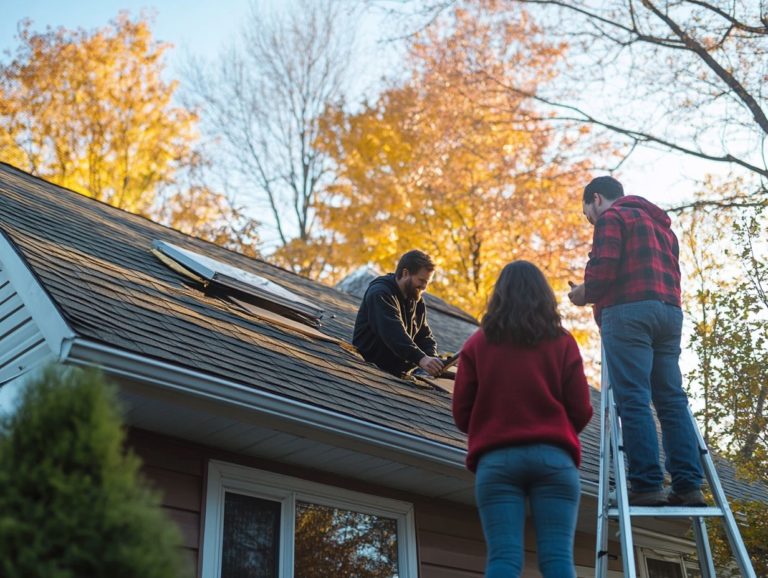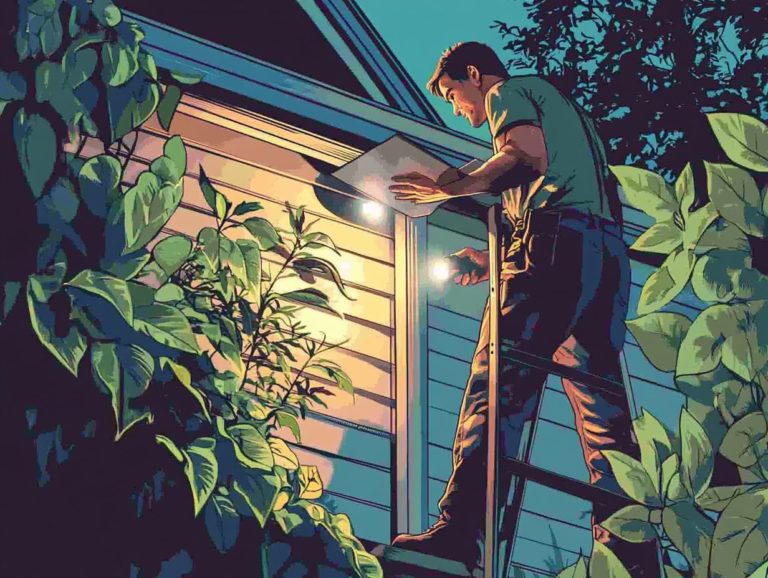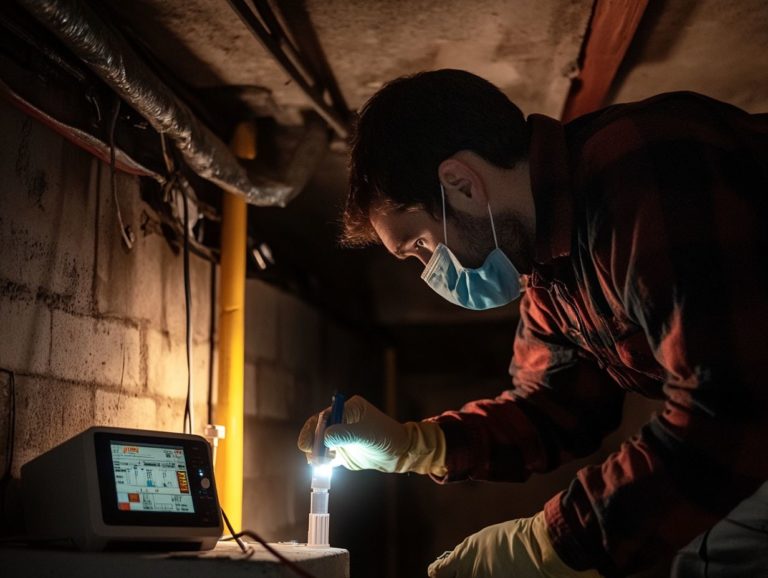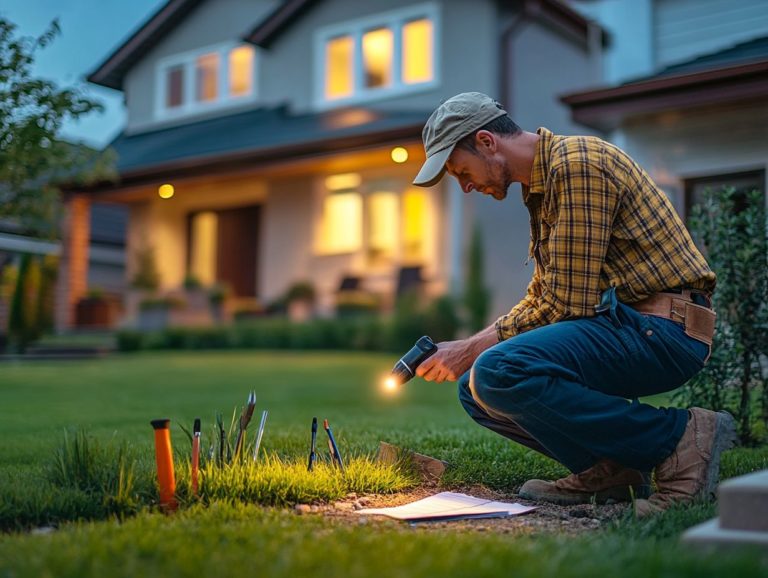How to Choose a Home Inspector: Key Factors
When you embark on the journey of buying a home, a comprehensive inspection can be the deciding factor between a rewarding investment and an expensive blunder.
Understanding the importance of a home inspector is essential. Their insights can significantly sway your purchasing decision.
This guide aims to assist you in selecting the ideal home inspector, emphasizing key elements such as qualifications, experience, and reputation.
Equipped with the right information, you can navigate the home buying process with confidence and make a well-informed choice.
Contents
- Key Takeaways:
- What is a Home Inspector?
- Why is Choosing the Right Home Inspector Important?
- Factors to Consider When Choosing a Home Inspector
- Questions to Ask a Potential Home Inspector
- Making the Final Decision
- Importance of a Home Inspection Report
- Common Issues Found During Inspections
- Utilizing Technology in Home Inspections
- Final Thoughts on Choosing a Home Inspector
- Frequently Asked Questions
- What are the key factors to consider when choosing a home inspector?
- Why is experience important in a home inspector?
- How can I check a home inspector’s reputation?
- Is communication style important in a home inspector?
- Should I consider a home inspector’s availability?
- How much should I expect to pay for a home inspection?
Key Takeaways:

Home inspector’s role: Understand the definition and importance of a home inspector in the home buying process.
Key factors: Consider qualifications, specializations, reputation, and cost when choosing a home inspector.
Questions to ask: Ask important questions about experience, certifications, and availability to ensure the best fit for your home inspection needs.
What is a Home Inspector?
A home inspector checks houses to find any problems before you buy. They look at everything from the roof to the plumbing.
Home inspectors check many parts of a house. They look at plumbing, electrical systems, heating, and safety.
Many qualified home inspectors have certifications from esteemed organizations, ensuring they adhere to the highest industry standards.
Why is Choosing the Right Home Inspector Important?
Choosing the right home inspector is crucial. Their insights play a pivotal role in the homebuying experience, affecting both your protection as a buyer and your negotiation strategies. For more guidance, check out how to select a home inspector for your needs.
A skilled inspector can unveil hidden issues that might not be readily apparent. This shields you from unforeseen home repair expenses and potential long-term complications that could surface after the purchase.
Therefore, the quality of their work and commitment to unbiased reporting are key components in ensuring a seamless transaction.
Factors to Consider When Choosing a Home Inspector
When selecting a home inspector, consider several key factors to ensure you engage a qualified professional. To learn more about the process, check out this guide on how to choose an inspector for your home that can deliver a comprehensive evaluation of the property.
Look at their inspection credentials, years of experience, and any specializations, such as radon and lead testing. For more detailed guidance, refer to how to choose the right inspector for your needs. The overall reputation of the inspector or inspection company also plays a crucial role.
As a potential buyer, you should prioritize local inspectors with positive customer reviews who adhere to established inspection guidelines. Don’t wait! Your dream home deserves the best inspection. Start your search today!
Qualifications and Experience
When evaluating potential home inspectors, understanding how to choose the best home inspector near you is crucial. Qualifications and experience ensure they possess the necessary expertise to identify critical conditions in a home.
Seasoned inspectors tend to navigate the inspection process more efficiently, delivering accurate and unbiased reports.
Beyond just foundational credentials, various certifications and specialized training can significantly enhance an inspector’s ability to spot subtle issues that might escape the notice of less experienced professionals.
For example, if an inspector is well-versed in local building codes, they can identify compliance differences during each assessment, recognizing when a home strays from established regulations.
Effective communication is also essential. Inspectors who can articulate their findings clearly allow you to understand the significance of each issue, enabling you in the decision-making process.
This blend of ongoing education and practical experience ensures that you receive high-quality, informed advice, enabling you to make smarter choices regarding your property investments.
Specializations and Certifications
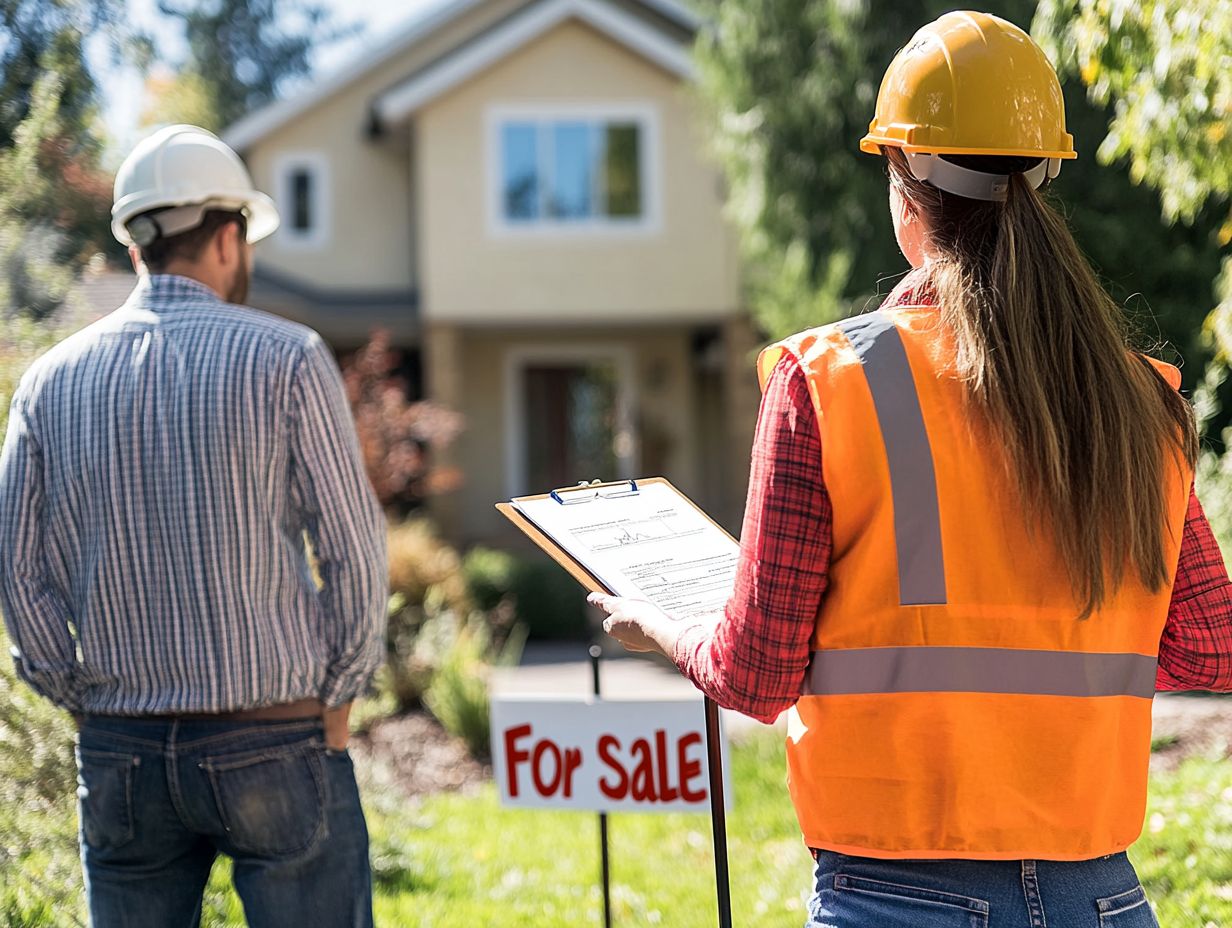
Home inspectors often possess a range of specializations and certifications. These significantly enhance their capacity to conduct thorough property evaluations.
For instance, you might come across inspectors certified for radon testing or lead testing. Some may even use special cameras that detect heat to uncover hidden issues that the naked eye simply can t detect.
These specializations help find dangers like toxic substances or serious structural issues quickly, ensuring potential hazards are identified effectively.
Take, for example, an inspector who focuses on electrical systems; they can provide valuable insights into outdated wiring, potentially averting fire hazards. Similarly, inspectors trained in pest evaluations can identify infestations that might lead to costly repairs in the future.
By leveraging their specialized training, these inspectors deliver more comprehensive reports that not only highlight existing problems but also estimate repair costs. This information enables homeowners to prioritize remediation efforts based on what s urgent and what poses the greatest safety risks.
Reputation and Reviews
The reputation of a home inspector is crucial for you to consider, as it directly reflects their quality of work and the level of customer satisfaction.
You should conduct thorough research on potential inspectors. Dive into customer reviews on platforms like the Better Business Bureau, Angi, Porch.com, and HomeAdvisor to assess their reliability.
Seeking references from local real estate agents provides invaluable insights. These professionals often work closely with inspectors and can recommend trustworthy individuals based on firsthand experience.
Personal recommendations from friends or family lead to inspectors with a solid track record.
During this evaluation process, transparency in customer feedback is especially important. Honest reviews highlight the inspector s strengths and reveal potential red flags, helping you avoid costly mistakes before making your hiring decision.
Cost and Availability
Understanding inspection fees and the availability of home inspectors is key for you as a buyer. Knowing how to choose the right inspector for your property can significantly shape your overall homebuying experience.
While fees can vary based on the complexity of the inspection services you need, it s crucial to find that sweet spot between affordability and quality of service. Location plays a major role in determining these costs; in urban areas, for instance, you ll often see higher fees due to demand and the cost of living.
The size and age of a property can also lead to varying prices. Larger homes or older buildings typically require more thorough evaluations.
As a buyer, prioritize scheduling inspections promptly to avoid delays in your buying process. Schedule inspections promptly to keep your homebuying process on track! Early assessments reveal potential issues that might impact negotiations.
To find local inspectors who fit your budget, turn to online resources, reviews, and recommendations from seasoned real estate professionals these can prove invaluable in your search.
Questions to Ask a Potential Home Inspector
Inquiring effectively with a potential home inspector can greatly enhance the quality of your home inspection process and the insights you derive from it.
Ask about their qualifications and experience. Also, find out what inspection technology they use and how they communicate results.
Making the Final Decision
Regarding making the final decision on which home inspector to hire, weigh several critical factors to ensure you choose the right home inspector for you.
Consider their qualifications, specializations, reputation, and cost. Ensure they communicate effectively and address your specific concerns about the property.
This thoughtful approach will guide you in selecting an inspector who aligns perfectly with your requirements.
Importance of a Home Inspection Report
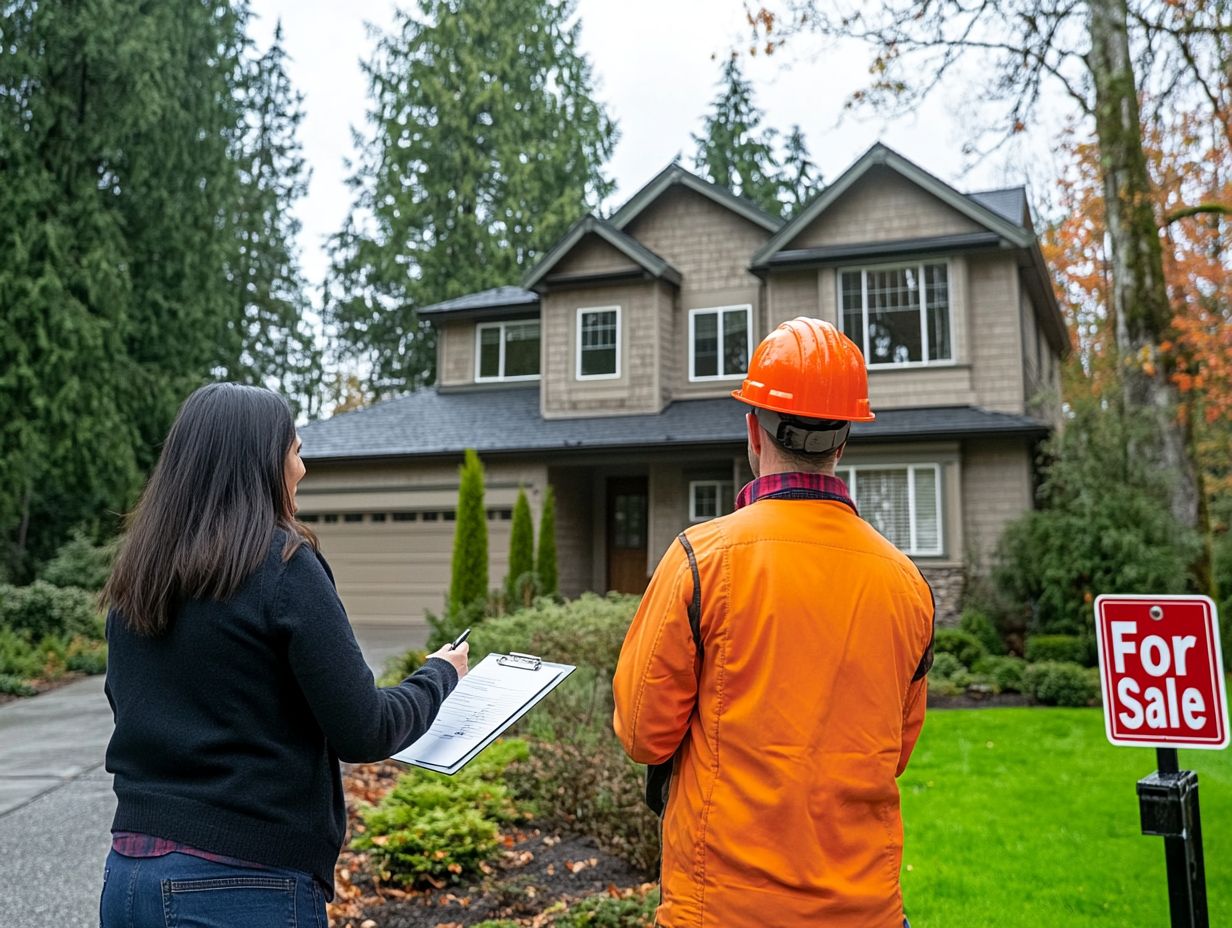
A home inspection report is crucial for your homebuying journey. It provides an objective overview of the property s condition and reveals hidden issues that may influence your decision.
This report serves as a detailed record of the inspection and is a vital tool for your protection and negotiation strategy. It could even sway the final sale price in your favor.
Common Issues Found During Inspections
During home inspections, several common issues can profoundly affect the integrity and safety of a property.
From structural concerns like foundation cracks to mechanical issues involving heating, ventilation, and air conditioning systems, along with potential pest infestations, these problems can lead to considerable repair costs. This underscores the importance of conducting thorough evaluations to safeguard your investment.
Utilizing Technology in Home Inspections
Advanced inspection technology has transformed the home inspection process. It allows for more accurate and detailed evaluations of properties.
With tools like thermal imaging cameras and tests for radon and lead, you can uncover hidden issues that traditional methods might miss. This ensures a comprehensive assessment for your clients.
Final Thoughts on Choosing a Home Inspector
Choosing a home inspector is a pivotal step in your homebuying journey, and learning how to choose the right home inspector for your property deserves your careful attention.
By considering various factors, you can ensure that you select a reliable inspector who meets your specific needs. Evaluating qualifications, specializations, and customer reviews will help you make informed decisions. For more guidance, check out this article on how to choose the best home inspector for your needs, enhancing your safety and satisfaction in your new home.
It s essential to understand the unique needs of the property and the specific challenges it may present. Conducting interviews with potential inspectors will help you gauge their communication style and approach to any issues that may arise.
By taking these thoughtful steps, you can significantly reduce the likelihood of unexpected headaches down the line. This paves the way for a smoother transition into homeownership and provides peace of mind regarding your investment.
Frequently Asked Questions
What are the key factors to consider when choosing a home inspector?
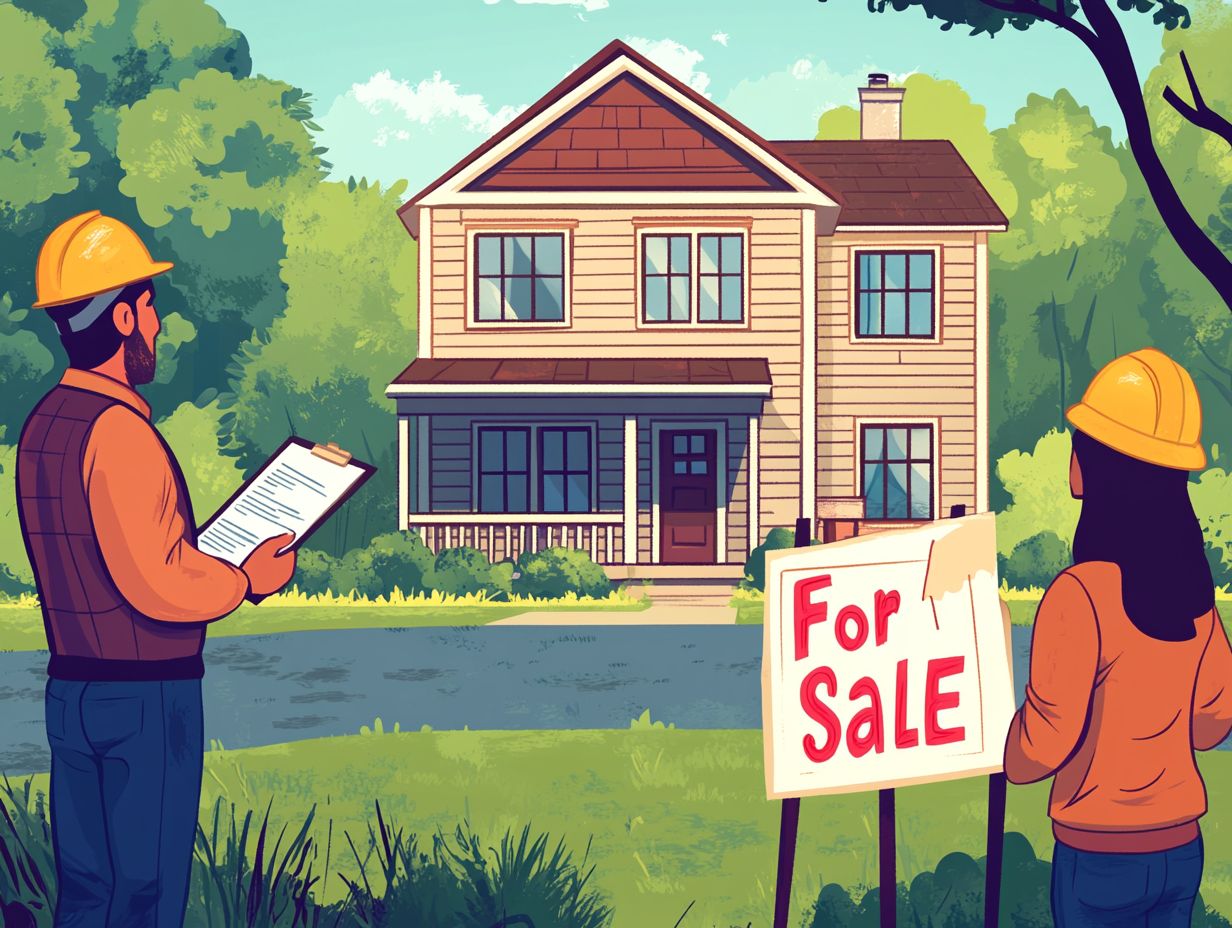
Key factors include experience, qualifications, reputation, communication style, availability, and pricing.
Why is experience important in a home inspector?
Experience is important because it shows that the inspector has the necessary knowledge and skills to thoroughly inspect a home. A more experienced inspector is likely to be more familiar with common issues and potential red flags.
How can I check a home inspector’s reputation?
You can check a home inspector’s reputation by reading online reviews and asking for references from past clients. Asking for their credentials and inquiring about any professional organizations they may belong to is also helpful.
Is communication style important in a home inspector?
Yes, communication style is important. The inspector should clearly and effectively communicate any findings or concerns during the inspection, ensuring you understand the home’s condition.
Should I consider a home inspector’s availability?
Yes, consider a home inspector’s availability. You want to ensure they can accommodate your schedule and perform the inspection at a convenient time.
How much should I expect to pay for a home inspection?
The cost of a home inspection varies based on factors such as the size and location of the home. On average, it can cost between $300 and $500. It’s important not to base your decision solely on price; consider the other key factors mentioned above.

